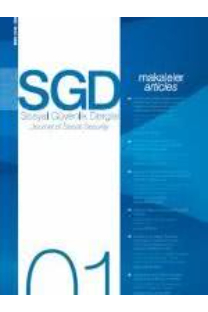İşletme Davranış Kodlarının Sosyal Hukuk Perspektifinden Değerlendirilmesi
A Review of Corporate Codes of Conduct with the Social Law Perspective
___
- Abbott, Kenneth W. ve Duncan Snidal (Summer 2000), “Hard and Soft Law in International Governance”, International Organization, Vol. LIV, No:3, Legalization and World Politics, 421-456.
- Aydemir, Muzaffer (2007), “İşletmelerin İşgörenlerine Karşı Sosyal Sorumlulukları ve SA 8000 Standardı”, Kurumsal Sosyal Sorumluluk: İşletmeler ve Sosyal Sorumluluk, (Ed: Coşkun Can Aktan), İstanbul, İGİAD Yayınları, 99-121.
- Başbuğ, Aydın (2010), Sosyal Hukuk: Hukukun Toplumsal Temelleri, Ankara, Binyıl Yayınevi.
- Blacket, Adelle (2001), “Global Governance, Legal Pluralism and the Decentereted State: A Labor Law Critique of Codes of Corporate Conduct”, Indiana Journal of Global Legal Studies, Vol. VIII, No: 2, 401-447.
- Breining Kaufmann, Chiristine (2007), Globalization and Labor Rights: The Conflict Between Core Labour Rights and International Economic Law, Portland, Hart Publishing.
- Corvaglia, Maria Anna (2013), The Complemtery of Soft and Hard Law in Public Procurement: Between Harmonization and Resilience, NCRR Trade Regulation, Working Paper No: 2013/10.
- Davis, Benett (1 March 1999), “Profit from Principle: Five Forces Redefining Business”, Futurist, 28-33.
- Ersöz, Halis Yunus (2007), Türkiye’de Kurumsal Sosyal Sorumluluk Anlayışının Gelişiminde Meslek ve Sivil Toplum Kuruluşları, İstanbul, İstanbul Ticaret Odası Yayını.
- Gutiêrrez, Andrês (2012), Davranış Kodları Eğitim Kitapçığı, Ankara, İcra Dairelerinin Etkinliğinin Arttırılması Eşleştirme Projesi TR-2009-IB-JH-02.
- Hepple, Bob (2005), Labour Laws and Global Trade, Portland, Hart Publishing. Jenkins, Rhys (2001), Corporate Codes of Conduct: Self-Regulation in a Global Economy, Geneva, UNRISD, Technology, Business and Society Programme Paper Number 2.
- Justice, Dwight W. (2002), “The International Trade Union Movement and the New Codes of Conduct,” Corporate Responsibility & Labour Rights: Codes of Conduct in the Global Economy, (Ed: Rhys Jenkins, Ruth Pearson, Gill Seyfang), London, Earthscan Publications, 90-100.
- Kağnıcıoğlu, Deniz (2014), “Çokuluslu Şirketler ve Çalışma Standartlarının Özelleştirilmesi”, Uluslararası Sosyal Politika: Teorisi, Uluslararası Çalışma Normları ve Güncel Gelişmeler, (Ed:. Pir Ali Kaya), Ankara, Siyasal Kitabevi, 379- 393.
- Keller, Helen (2008), “Corporate Codes of Conduct and Their Implementation: The Question of Legitimacy”, Legitimacy in International Law, (Ed: Rüdiger Wolfrum ve Volker Röben, Heidelberg), MaxPlanck-Institut für Ausländisches Öffentliches Recht und Völkerrecht, 219- 298.
- Koçer, Rüya Gökhan ve Luc Fransen (2009), “Codes of Conduct and the Promise of A Change of Climate in Worker Organization”, European Journal of Industrial Relations, Vol. VX, No: 3, :237-256.
- Kolk, Ans ve Rob Van Tulder (2002), International Codes of Conduct Trends, Sectors, Issues and Effectiveness, Rotterdam, Erasmus University Rotterdam.
- Kolk, Ans; Van Tulder, Rob ve Carljin Welters (April 1999), “International Codes of Conduct and Corporate Social Responsibility: Can Transnational Corporations Regulate Themselves?”, Transnational Corporations, Vol. XIII, No: 1, 143-180.
- Macklem, Patrick (December 2001), Labour Law Beyond Borders, University of Toronto Faculty of Law Public Law and Legal Theory Research Paper No.02-02. Mamic, Ivanka (2004), Implementing Codes of Conduct: How Businesses Manage Social Performance in Global Supply Chains, Switzerland, Greenleaf Publishing.
- O’Rourke, Dara (2003), “Outsourcing Regulation: Analyzing Nongovernmental Systems of Labor Standarts and Monitoring”, The Policy Studies Journal, Vol. XXXI, No:1, 1-29.
- Oyan, Oğuz (Ekim 1999), “Çok Uluslu Şirketlerin Davranış Kodları”, Perşembe Konferansları, 33-60.
- Parlak, Zeki (2009), “Çokuluslu Şirket Davranış Kodları: Bir Analiz ve Değerlendirme”, İşletmelerde İş Etiği, (Ed: Sabri Orman ve Zeki Parlak), İstanbul, İTO Yayınları, 171-216.
- Pearson, Ruth ve Gill Seyfand, “New Hope or False Down? Voluntary Codes of Conduct, Labour Regulation and Social Policy in A Globalizing World,” Global Social Policy, Vol. I, 49-78.
- Scherrer, Christoph ve Thomas Greven (2001), Global Rules For Trade: Codes of Conduct, Social Labelling, Workers’ Rights Clauses, Münster, Westfälisches Dampfboot.
- Sobczak, Andrê (2003), “Codes of Conduct in Subcontracting Networks: A Labour Law Perspective,” Journal of Business Ethics, Vol. XLIV, 225-234.
- Sobczak, Andrê (2006), “Are Codes of Conduct in Global Supply Chains Really Voluntary?: From Soft Law Regulation of Labour Relations to Consumer Law”, Business Ethics Quarterly, Vol. XVI, No:2, 167-184.
- The Global Compact, İmzadan Sonra Birleşmiş Milletler Küresel İlkeler Sözleşmesi’ne Katılım Rehberi, Çev: Ayşegül Hatay, New York, Global Compact Network Turkey.
- Vranken, Martin (2009), Death of Labour Law: Comparative Perpectives, Melbourne, Melbourne University Press
- ISSN: 2146-4839
- Yayın Aralığı: 2
- Başlangıç: 2011
- Yayıncı: SOSYAL GÜVENLİK KURUMU
İşletme Davranış Kodlarının Sosyal Hukuk Perspektifinden Değerlendirilmesi
CANAN GÜNEŞ, ZERİFE YILDIRIM, Şenay ÜÇDOĞRUK BİRECİKLİ
Sanayi Devrimi’nden 21. Yüzyıla Batı Dünyasında Engellilik
Değişen Refah Devletleri ve Sosyal Yardımlar
BRICS Ülkelerinde Kamu Sağlık Harcamaları Etkinliğinin Belirleyicileri
